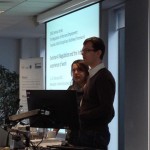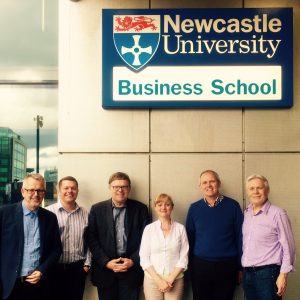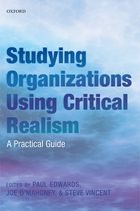There was a lively and successful “roundtable” at Newcastle University Business School on Qualitative Research Methods in June 2016. The discussion leaders included: Greg Bamber, Monash University (right) and all from Newcastle: Mick Brookes, Andrea Whittle, Frank Mueller, Steve Vincent, Steve Procter and (not in the picture) Daniel Muzio. Other participants included a range of early career researchers and PhD students. The event was co-hosted by two NUBS Research Groups: Human Resource Management, Work & Employment, and Strategy, Organisations & Society. The event was organised by Frank Mueller, Greg Bamber and the NUBS Research Team.
A team from the Human Resource Management, Work and Employment Group participated in the annual British Universities Industrial Relations Association Conference (BUIRA) hosted by the University of Leeds. Members of the group have also taken over the stewardship of BUIRA for the next three years (2016-2019). The new team are Jo McBride (President), Mick Brookes (Membership), Stewart Johnstone (Communications), Ana Lopes (Events) and Stephen Procter (Treasurer). Established in 1950, BUIRA is one of the largest academic associations in the United Kingdom aimed at promoting the study of employment relations across relevant academic disciplines. For more information about the association see http://www.buira.org/
ESRC Seminar 4
 On the 12th and 13th February, Newcastle University Business School hosted the 4th seminar in the ESRC series ‘The Regulation of Work and Employment’. This two-day seminar covered regulation of professional identities, regulation of careers, self-regulation at work, regulation and intersectional inequalities, intersectional approaches to regulation and regulation and global workers. Andrew and I were rapporteurs for the first two sessions of day one, giving us a chance to reflect on key themes of the discussions, and consider how these issues related to our own research areas.
On the 12th and 13th February, Newcastle University Business School hosted the 4th seminar in the ESRC series ‘The Regulation of Work and Employment’. This two-day seminar covered regulation of professional identities, regulation of careers, self-regulation at work, regulation and intersectional inequalities, intersectional approaches to regulation and regulation and global workers. Andrew and I were rapporteurs for the first two sessions of day one, giving us a chance to reflect on key themes of the discussions, and consider how these issues related to our own research areas.
The morning session involved discussions of individual experiences of work and regulation. The first presentation was delivered by Professor Carol Woodhams of Exeter University Business School. Carol’s presentation displayed a quantitative analysis of intersectional discrimination relating to pay in a large private sector company, and raised a number of interesting issues.
Intersectional research is very rarely carried out using a quantitative approach; but, as Carol pointed out, quantitative methods can be useful to influence public policy and impact more widely ,as quantitative data is generally seen as ‘hard evidence’. In my own experience of working with trade unions, statistical data seems to have more impact than purely qualitative data. However, as a member of the audience noted, quantitative data which controls for issues such as level of seniority and working patterns risks masking structures and processes that exacerbate inequality in the workplace. For example, while it is eye-opening to see the disadvantage of simply being female, it is also important to consider how gendered role expectations and stereotyping may lead to unequal economic choices (such as part-time work and unpaid domestic labour).
Carol also highlighted the multiplicative impact of intersectional discrimination, with the data strongly suggesting that while for most men, privileged characteristics can result in additive pay advantage (i.e. every privileged characteristic a man possesses adds to his pay packet), for women the negative impact of unprivileged characteristics creates multiplicative disadvantage, outweighing any advantage gained from privileged characteristics. Given the Coalition government’s decision to remove the provision for intersectional discrimination from the Equality Act, this raises serious concerns about the discrimination protections offered by current law.
Finally, Carol raised questions about the business case for diversity, suggesting the true case is around cost – the more diverse the workforce the cheaper it is. This was a contentious statement amongst audience members, but it does offer food for thought – after all, we had just seen that even ‘best practice’ employers fail to pay their workers fairly….
The second presentation that day, by Professor Mark Smith of Grenoble Ecole de Management, considered how different groups of workers had experienced regulation. Focussing on two specifics groups of workers – child carers and interns – Mark showed that individual agency could operate within a regulated environment, but also highlighted that regulation had brought both positive and negative results, as well as unintended consequences. To get regulation right, we need to consider the impact on both sectoral groups and groups within specific sectors and organisations.
Thinking about this in the context of my own research, the regulation of trade unions within workplaces – for example, the reductions in facility time for trade unions introduced by the Coalition government – will have a clear impact. If, as seems likely, it limits the ability of the most vulnerable groups of workers to gain (or maintain) a voice to protect and further the terms and conditions of their employment then this should be a serious concern for those who wish to promote the genuine business case for diversity.
In the afternoon we had two fascinating presentations about regulation and migrant work – one by Olena Fedyuk from the University of Strathclyde, who was talking about Ukrainian migrants in Italy and Ireland and how their experiences in these countries were shaped by immigration policies. And then we had Sophie Gamwell from Middlesex University, who delivered outcomes of a research on recruitment of nurses from outside the UK, in particular talking about framework agreements and changes in recruitment practices it may entail.
Both of them, although looking at drastically different population groups within dissimilar institutional and cultural context, emphasised some issues, which I believe, are familiar to everyone who has undertaken an attempt to study migrants work experience. And, being slightly egocentric, I cannot resist admitting that these matters resonate with my research project on career pathways of highly skilled migrants in the North-East and how their careers may be navigated by different factors, such us social networks.
Within the context of migration, regulation appears as an issue of exceptional importance. Not just migrants’ employment, but even their very physical presence in the host country is a subject of regulation, not to say oppression. And whilst our discussion was revolving mainly around lower-skilled migrants, we should not assume that highly skilled ones are not affected by regulations. In fact, to some degree they be in even more vulnerable position, for highly skilled jobs are normally highly regulated, which entails numerous difficulties with recognition of foreign qualifications and experiences.
Not surprisingly all our presenters were engaged to some extent with the issues of justice and equality. Yet, in migration studies we should be very cautious when operating with the term ‘discrimination’. Too many studies tend to ascribe all observed inequalities in labour market performance to discrimination, although there might be other factors that ought to be examined. And we should ask ourselves – what sort of discrimination are we talking about? Do we compare foreign workers to the indigenous population or to other groups of immigrants? Further inquiries will most likely find significant differences in the labour market attainments of White natives and White immigrants, as well as White immigrants and Black and Ethnic Minorities migrants, not to mention that even these groups are far from being homogeneous, and regulations of careers of White migrants from the EU and elsewhere differ quite radically.
It might be interesting to explore how the notion of skills can be regulated as well, typically in accordance to the current needs of the host labour market. For instance, some years gardeners and hairdressers were referred to as skilled occupations, but once the need for them had been met, the political discourse had changed and they were relegated to the semi-skilled category, diminishing opportunities to migrate for these professionals and presumably affecting their professional identities.
Future investigations should also pay more attention to how migrant workers exercise their own agency and how they can stimulate certain changes or adjustments of regulation. We can think of a Kurd community in Germany, who were regarded as an unproblematic part of a much larger Turkish community. Thus, the Kurds were subjects of the national German regulation which restricted their participation in the mainstream economy, but at the same time norms imposed by the Turkish majority limited their chances to secure employment on the ethnic job market. Only after a few years of negotiations the Kurds were granted a status of ethnic minority and were permitted to establish their own media, schools, kindergartens and businesses of that sort. Consequently, many unemployed (or employed in routine and mundane roles) Kurds gained skilled or highly skilled jobs, improved financial well-being and upgraded their social status.
We shared these and some other ideas on day two of the seminar in the hope that it would stimulate further discussions and debates needed to expand our understanding of regulation of work and employment and to demonstrate how it can be examined from different perspectives and analysed on multiple levels. The seminar has indicated once again the immense amount of work going in this direction. Yet, much more is needed to advance existing knowledge and we believe future investigations will yield results applicable and valuable for various fields of study, including our own.
Regulating Work: The Importance of the Geography of the Value Chain
Last week I was lucky to spend two days in beautiful Tuscany at an excellent ESRC-sponsored seminar on employment regulation hosted by faculty from Newcastle (England), Strathclyde (Scotland), and Monash (Australia) universities. As the stimulating presentations unfolded, a pattern emerged: in cases where the geography of employment regulation matched the geography of the value chain, regulation was effective; otherwise it was not.
As Nigel Haworth described, in the New Zealand fishing industry, the state is a robust actor in regulating working conditions on fishing vessels because particularly valuable species of fish are only found in New Zealand waters. So demand for those fish can only be filled by work that takes place there. In contrast, New Zealand recently weakened labor laws for workers in the movie industry because Warner Bros could have filmed “The Hobbit” somewhere else. Regional approaches to governing Italian workplaces match the vibrant pockets of Italian industrial districts (Luigi Burroni), whereas unions in Sierra Leone struggle to represent the large numbers of informal sector workers (John Stirling). And local and national attempts to create safer garment workplaces in Bangladesh and elsewhere have failed because of the ease of shifting production to new locations. So in this case, international standards are needed (Janice Bellace).
Of course I’m not the first to think of these linkages. In 1909, John R. Commons, the father of American industrial relations, published a once-famous article, “American Shoemakers, 1648-1895: A Sketch of Industrial Evolution.” Commons illustrated how workers’ efforts to improve their working conditions matched the evolution of the shoemaking production process and the nature of the “competitive menace.” When shoemakers were skilled craftsmen largely working as individuals, they formed guilds to prevent unskilled, substandard shoemakers from undermining their standards. When shoemaking became more of a job, workers formed unions, first on a local basis. And as the competitive menace expanded with the extension of the production and distributions systems, local unions joined to become national in scope, and they lobbied for protections in international markets.
Putting all of this together, we can think of the geography of the value chain as ranging from atomistic to global.
And then we must note that effective regulation typically occurs when the geography of the value chain is in the middle range (local and national systems)–this is the “sweet spot” of effective regulation and governance. For value chains that are more atomistic or more global, it is often difficult to establish and enforce labor standards and to give workers effective voice.
If this analysis is right, it should be particularly alarming because trends in work point toward both ends of the geography of the value chain as increasingly important, not the middle. The effects of globalization on manufacturing over the past few decades is a well-known story, but services, too, are increasingly becoming globalized—for example, through outsourcing to lower cost areas, such as has happened with legal research and Catholic prayer fulfillment. At the opposite end of the spectrum, in addition to the millions in developing countries who work in informal sectors, there are many atomistic areas on the rise in developed countries, such as the self-employed, independent contractors, and household-based workers such as home health aides.
These are not new issues (see Commons), and they are not easy issues. But they are issues of critical importance. The geography of the value chain is dynamic in today’s organizations and economies. The regulation of work cannot continue to only hit the sweet spot of subnational and national value chains. We need to continue to figure out how to design strategies for governing work—whether privately crafted through unions and other institutions, or publicly crafted through government regulation—that match the dynamism of the geography of the value chain across its full spectrum. Only then will work really work for all.
This post first appeared on John Budd’s monthly blog, Whither Work?, on Monday 22 September 2014, and available at http://whitherwork.blogspot.com/.
Let’s get real about social research
Paul Edwards, Joe O’Mahoney and Steve Vincent
If you go to the philosophy or social theory section in any decent public or university library you will find voluminous and, we think, rather interesting tomes outlining realist philosophy. In our opinion, these works provide the most plausible approach to understanding the things that go on in the world and how its many parts are interrelated. One of the commitments of this approach is that the forces that cause things happen do not have to be doing anything to have an effect. Take the example of a filmless speed-camera, which routinely slows down the traffic despite the fact it is practically useless for the purposes of enforcing a speed limit. The actual causes of events can be difficult to know and this creates all sorts of problems for researchers. We were left wondering how to develop research methodologies that scratch beneath the surface and seek out those invisible things that actually matter. The philosophy and theory books offer little guide as to how to do it. We thus started to identify social researchers who used critical realism to inform their work and asked them how a commitment to critical realism affected what they did in practice. Our book “Studying Organisations Using Critical Realism” is the outcome of these endeavours.
Our contributors to are suspicious of positivist social scientists, who claim to be “proper” scientists. Positivists tend to explain social phenomena by making generalisations from statistical correlations between observed events. In these accounts all that matters is that which can be measured, which rather fails to scratch beneath the surface – the existence of a speed camera and its correlation with reduced speed offers an explanation in itself. On our opinion, this seems rather thin. Our contributors also feel that social constructivists, who reduce social complexity to the discourses we use to understand it, rather throw the baby out with the bathwater. Whilst the subjective schemas of the driver and their identification the speed camera matter, other things, such as the very real consequences of being caught speeding, tend to fall away from view, despite the fact that these things must be implicated in an explanation. Critical realism encourages the researcher to dig deeper, to reveal the abilities of the driver (their memory, their [in]ability to perceive whether the speed camera has film in it or their imagining of the consequences of their actions). Critical realists look beyond the immediate event, to a world in which traffic enforcement officers have power to sanction behaviour and people know this to be the case. It is only by taking account of this broader range of matters that we can develop a better explanation of why the driver put her foot on the brake as she approached the (redundant) speed camera.
The problem that realists have with positivist and social constructionist approaches is not just that they lack explanatory depth, but that their explanations bear absolutely no relation to the lived experiences of individuals. One hopes that positivists might accept a declaration of love without reaching for the measuring tape and scales, or that constructionists might accept advice about vaccination requirements before they jet off on an exotic holiday. Alternative scenarios in day-to-day life are obviously ludicrous, but for some reason the assumptions seen to carry weight in academia.
In our view, as a consequence of its richer approach to understanding human activities critical realism is the least-worst ontology available and, as such, it should be embraced. We say least worst because, as a result of a commitment to this ontology, we also recognise that our empirical observations are often only flotsam generated by underlying processes which are often invisible; that things can be real at different, related levels; and that many things have properties, powers and potentials that are not presently identifiable. The point is that these commitments all make the process of doing social research quite difficult (indeed, in our view this is why many researchers reach for the relative security of positivist or social constructionist comfort-blankets, or retreat into abstract theory).
However, whilst these commitments make social research difficult we do not see these challenges as insurmountable. Furthermore, the answers that realists develop are, at a basic level, more similar to the ones the “woman on the street” might recognise. If we are to understand, for example, entrepreneurial behaviour, it is useful but not sufficient to show that they are drawing on discourses such as those of “the enterprise culture”. It may also be useful to know that entrepreneurial behaviour is correlated with certain social factors, such as having a parent who was also an entrepreneur. But these explanations are very partial indeed. A realist approach would not only examine the discursive resources that people draw on when they make decisions or their socio-economic characteristics, but also the context within which they reside, the resources they have access to, their attitudes towards their activities and the consequences of their activities for the things that happen around them. In short, critical realist social researchers embrace a rich view of the social agent, who is affected by the things in the surrounding context in knowable ways, whilst they are also engaged in projects that are designed to satisfy their own wants and desires. Who could disagree with this?
The research methodologies outlined in our book unpick, in different ways, aspects of this rich perspective on social agency. We chose to focus primarily on the world of work and organizations, in part because of their centrality to social life and in part to provide a common focus for the individual chapters. These chapters embrace core research methods such as interviews, the case study, discourse analysis, ethnography, action research, comparative methods, and quantitative modelling. Each chapter explains main lines of debate, outlines a realist approach, discusses how it makes a difference, and offers detailed illustration of how the approach works in practice. Realism comes, however, in several varieties. Each chapter explains the specific use made of it, and the challenges faced. We also included some scholars with a broad commitment to realist explanation and others who embrace critical realism – the central difference being that the latter also see their explanations as having reasonably direct implications for social action, whereas other realists prefer a distinction between analysis and prescription. We also included a chapter that reflects on the wider challenges facing realism, critical realism, and later developments known as dialectical realism.
The end result is a compendium that will prove useful for any social researcher who believes there is more to the world than words and numbers, and who then wishes to engage in concrete research. It will also help the many adherents of realism to grasp what the approach can do empirically, but also to see some of the challenges involved.
ESRC Seminar 2 – University of Strathclyde
Under the rubric workplace regulation, employment and State, 58 practitioners in the world of work ranging from academic professors to swarfega’d trade union officials, met to explore the changing dynamics of workplace regulations in the context of declining collective regulation and shifts towards individualistic HRM. The role of trade unionism, in supporting and resisting regulation, quest for mutual gains and the suitability of the proposition to (re)theorise rise employment relations and HM practices to account for the impact of supranational level regulations, as well as a reconfiguration of ‘rules’ at the national level. Heavy biscuits indeed!
But the good news is that this melange of participants opened up deep discussions about real issues about real people in the workplace.
Ringmastered by the urbane Paul Stewart, the morning session looked at performance management, from the vantage point of Prof Phil Taylor of theUniversity of Strathclyde. In terms of his own performance this was a ‘tour de force’ in which he concentrated on the “not so new” workplace tyranny. Phil’s PowerPoint and his handouts were with clear and convincing. So much so on my return to London I circulated them to the appropriate people in my own organisation and to a tranche of researchers in the fields of industrial relations and employee relations. With 15% of the participants from trade unions, we clearly appreciated Phil’s research and his apposite analyses. Simply, it struck a chord with the realities of collective-bargaining in whole swathes of the workforce in modern Britain.
From the anodyne world of human resources to the impact of hundreds of systems creating workplace bullying on an industrial scale. Essentially Phil’s analysis is that this is a seismic moment not simply a time of the business cycle but by redrawing of the new political economic landscape in the recasting of employee relations. This was in concert with the political and legislative onslaught on workers rights and the managerial offensive in the workplace. Concentrating on three integrated elements of the offensive,Phil highlighted performance management, lean working and sickness absence management. Phil concluded that there had been convergence with white collar workers and manual workers and technical workers and professionals. Bluntly, he exposed the meretricious nature of HRM as had been recently practised. Reassuringly Phil’s conclusion was based on the reality of daily events and practices in the workplace that performance management isn’t benign but sinister. A concrete target was the use of the Bell Curve “rank and yank” -which was to be rejected in principle and practice. And his prescriptions were spot on, concrete and achievable. This was a bravura performance by the speaker which was a brilliant springboard into the rest of the day’s activities.
Dr Nathan Lillie of the University of Jyvaskyla in Finland, focussed on “Homo Economicus”
The ideal new European Union Citizen is a mobile worker reacting to the changing contours of the labour market. By constructing an unregulated market this essentially legitimises this market as” normal” this epitomises the evident myth of Homo Economicus as “people have the right NOT to have rights” Nathan was of the view that posted work was a red herring and an invasion of regulation via territorial sovereignty. In his view citizenship in a liberal market confirms rights and belongings and enables market behaviours. Difficulties occur when “home” country practices are introduced for migrant Labour and this results in trade union rights being diminished and social isolation of the workers from abroad. The example of the apartheid regime and the two-tier legal system created an even more segmented labour market. That’s why there was always a call for class solidarity and perhaps that is a reflection of the apartheid in China today with the divisions between rural workers and their city equivalents. Nathan gave an instance of the Finnish construction union where there was an example of solidarity action on behalf of migrant workers
From the University of Manchester, Prof Miguel Martinez Lucio, looked at the management practices, new forms of management,management intervention and Regulation . Miguel labelled this is the stirring of the dark side in organisational behavioural HRM, with the firm in the frame. Trade unions, he argued, need to focus on the firm and the issue of decentralisation in industrial relations. The tripartism of the state had been transferred into the firm and the new forms of collectivism had been determined by the firm. Miguel stated “the new management becomes a new revised actor. Business schools become cathedrals of management.” The state doesn’t disappear but supports business and assists the firm. This is the politics of FDI and inward investment, with the facilitative state creating a new regime of control, marginalising trade unions. Underscoring this was the fact that every government since 1980 when theyhad put employment rights on the statute book; these were invariably individual rights and NEVER collective rights. With New Labour came the sponsorship of business unionism, and partnership with the state colonising spaces or even pulling out of the real dialogue. This period of 1997 to 2010 then witnessed “participation”being pushed out by performance management. Perspicaciously Miguel heralding the view that because of these processes,collective bargaining and oppositional “memories” had been lost. This struck a particular resonance with me in that this was exactly tthe phenomenon which had been belatedly acknowledged in the aftermath of the social contract in the 1970s. And again there was the bitter experience evidenced in the Fire Brigade union strike recently. Bluntly some trade unions (through no fault of their own) had been gullagged into a false sense of security and in going through the Social Contract and partnership model, had lost the art of being able to collectively bargain, neither having retained the skills nor the ideological base to win their justified arguments.
The role of ideology and language oxygenated the move from the cumulative state to the regulatory state,to the ideological state, onto to the coercisive state. The state according to Miguel was now caught in a double movement. With the state in the 1950s and the 1960s being a good example of a good employer,this impacted directly on private employers with decent frameworks in place. Now there is an incapacity of the state -a dysfunctionality. Collectivism is a terrain of struggle.Miguel invited the audience to consider if there was a crisis of management in the firm .The difference between “employers and managers” is increasingly important. This was a theme picked by a good number of participants with companies being owned by faceless people , equity trusts,etc and managed by utterly separate managers. INEOS at Grangemouth would be such an example.
With the state redefining its role as a deliberate strategy does that mean everything is moving towards quantification. It’s interesting in the role of manager that few people now want to be a head teacher. Perhaps, Miguel argued, there was a need to research managerial work in the context of its participative forms. Most practitioners don’t want to talk about regulation yet regulation is omnipresent albeit indirectly. Concluding that the state is being restructured creates “a space” which has to be taken up.In Miguel’s view UNITE the union was attempting to fill this current void.
Moreover Miguel argued that inevitably, with the privatisation of the consultancy state and the reality of boom and bust, the state has to “pick up all the debts”. The costs of stress, neo-liberalism, new management practice,s riots and redundancies -it is always always the state which is left with the tab – and the cost to the public purse is enormous.
The afternoon session was kicked off by Brian Garvey from the University of Strathclyde who argued that all the discussions need to be looked at the context of globalisation and Orwellian scenario of sustainable development. Brian looked at ethanol as a fuel and the agritoxins such as methaneHe asked “what are the systematic externalities of this production.?”
The Plenary Session was a discussion chaired by Stewart Johnstone.There were a number of questions about “soft regulation”,” new government”and the role of New Labour’s proactive( but weak intervention) clearly body swerving collective-bargaining and going for our “educative” partnership approach. If there is a disconnected capitalism, is there disconnected Labour? A series of question and answers surrounded topics such as inequalities, the role of academics, Brussels, EU funding, the potential to exploit the enormous resources which exists within workplaces often through Trade Unionists about initiatives on the learning agenda,for example, on Science Policy where hundreds of thousands of trade union members were qualified practising and informed scientists and should have a view collectively.A fiiting end to a demanding day!
This is my first blog and therefore a wee bit hesitant about my own flavour on things. Nevertheless this was a belting event,with a very wide range of participants who never really got the chance to mingle, chat and network, so intensive was the programme. I was very pleasantly surprised and impressed by the contributors .
I believe that analogy is the mark of a second-rate mind so here’s an analogy. This ESRC seminar series is the space where there is a genuine and needed debate informed by top-class academic research and experienced practitioners in the regulation of work and employment. Newcastle and Strathclyde were both eye-openers for me and I’ve migrated lots of the materials and ideas throughout my union with one and a half million members, 1300 employees and the UK Labour Party biggest affiliate and financial donor. And as an organisation we are not frightened to punch above our weight. So the pebble – which is the seminar series – has already had a significant RIPPLE effect.
On a lighter note, I thought that was merit in people meeting the night before to explain what each was doing and how it may connect with our own activities. The dinner at Newcastle was a first-class opportunity which I appreciated. As a “Glesca Keelie” myself, I was anxious that those who visited the city from the first time had the opportunity to do you a wee bit of exploring the City. Taking them to some of Glasgow’s famous watering holes was easy, getting them out proved impossible. And therefor the delights of Glasgow Cathedral and the Glasgow School of Art with its different CRM were not witnessed.
All in all, a very valuable and satisfactory experience for myself and colleagues whom I had dragooned to Strathclyde. Of course I accepted all the plaudits from them as they too really appreciated the lectures, debates and discussions.
Regulating of Work and Employment: Insights in Newcastle
Quote
On a relatively mild winter’s day 22 January 2014, in the vibrant city of Newcastle upon Tyne in North East England, there was a day of interesting discussions about the Regulation of Work and Employment. This was led by an international team from Newcastle University; Monash University, Melbourne, Australia and Strathclyde University, Glasgow, Scotland. The day was the first of their 2014-15 Economic and Social Research Council (ESRC) Seminar Series.
This Seminar was held at the top of the new Newcastle University Business School building. The venue boasts magnificent views over the fine cityscape of Newcastle. Its highly regarded civic University was born in 1834. It is one of the elite Russell Group – the research-intensive leaders among UK universities.
This ESRC Seminar Series has an important and topical theme: Regulation of Work and Employment: Towards a Multidisciplinary, Multilevel Framework. The first seminar focussed on asymmetries, ambiguities, similarities and contradictions in agendas for regulation addressing such questions as: What has changed in the way regulation is understood and used? What underlying assumptions are identified in the ways in which regulation of work and employment is understood and used by different stakeholders (e.g., academics, businesses and other employers, intergovernmental agencies, and the labour movement)? The seminar explored the extent to which work and employment should be regulated or deregulated, as well as how regulation should be developed and applied in practice. To this end, participants discussed the forces that give rise to various patterns of regulation at local, national, supranational and international levels.
The Seminar was opened with a warm welcome to the North East by Professor John Wilson, the Director of Newcastle University Business School. The other brilliant speakers who led discussion of these issues included:
- Gill Dix, Head of Strategy, Advisory, Conciliation and Arbitration Service (Acas)
- Steve Hughes, Professor of International Organisations, Newcastle University
- John Kitching, Professor, Small Business Research Centre, Kingston University
- Thomas Kochan, George Maverick Bunker Professor of Management, Massachusetts Institute of Technology (MIT), U.S.A.
- Jim Mowatt, Director of Education, UNITE the union.
This excellent Seminar was organized efficiently by a talented Newcastle Team: Drs Jenny K Rodriguez, Stewart Johnstone and Tracy Scurry, with a helpful support crew. It was co-chaired by Professor Steve Hughes and this blog writer.
The Seminar was well attended by people from around the UK and Ireland; there were lively and stimulating discussions. In Australia and elsewhere, we hear calls for de-regulation of the labour market, for example, in terms of levels of pay and employment protection, with proponents arguing that de-regulation will create jobs. However, they don’t mention a consequence of such de-regulation: that it can facilitate an unfortunate ‘race to the bottom’ in terms of wages and job security!
Am looking forward to continuing the discussions about such regulation dilemmas at subsequent seminars in the series.
One Keynote Speaker, Jim Mowatt, an experienced union leader, observed:
‘I did learn a lot out of the whole experience – including the preparation which I had to undertake, the discussions … and the time which l factored in to reflect on the topic. During and after, I soaked up lots of insights and benefited from the other speakers’ research and experiences. I am bringing all of my Regional Directors to the Strathclyde University event in my home town of Glasgow; plus a couple of really “switched on” researchers.’
Another Keynote Speaker, Tom Kochan advocated fundamental change in the way in which work and employment is regulated, especially in the U.S. Later, he commented:
‘This seminar series couldn’t be more timely. Across the globe national governments, labour organisations, businesses, and international organisations are experimenting with new strategies to catch up with how and where work is carried out and how to assure basic labour standards, rights, and opportunities for improvement are realised. I learned a lot at the first seminar and recommend future sessions to all who share an interest in, and want to find ways to contribute to, meeting this challenge.’
For Kochan, visiting from the U.S., it was his first visit to the land of ‘Geordies’. So before and after the Seminar, we explored some of the locale together. He asked about Newcastle’s history. It can be traced back almost 2,000 years.
Briefly, the Roman Emperor Hadrian devised his great wall built from coast to coast across northern England during his visit to Britain in AD122. One rationale for Hadrian’s Wall was to try to regulate the most northern boundary of the Roman Empire. Hadrian’s Wall crossed Newcastle, not far from where Newcastle University Business School now stands tall on the site of a former major brewery, which used to brew the world-famous Newcastle Brown Ale! The School is next to the iconic St James Park Stadium, home of Newcastle United Football Club, which was founded in the 19th century.
In the 19th century, in particular, Newcastle prospered as one of the cradles of the Industrial Revolution. It was also one of the cradles of the labour movement, as working people struggled to win influence over the regulation of their work and employment. Newcastle was internationally famous for technological innovation associated with its main industries. These included coal mining, shipbuilding and electrical and heavy engineering including railways and armaments manufacturing. Such industries declined here in the face of globalization, especially in the post-1945 period, as other countries developed these industries.
During World War II, the Luftwaffe targeted the Tyneside armaments factories and shipyards, which were vital for the UK war efforts. Nonetheless Newcastle escaped the severity of the devastation inflicted upon London, Coventry and some other UK industrial cities that were bombed more heavily by the Germans. Therefore Newcastle retains a good selection of its wonderful Victorian architecture, which reflects its 19th century prosperity. The University is a lead partner in the Newcastle Science City initiative, which promotes Newcastle as a city of science and innovation. This includes much 21st century urban re-generation to replace the older industries.
After showing Tom around, I reflected on my links with this locale. In the 19th century, some of my maternal ancestors migrated from Ireland to Newcastle, to seek work. My late parents had played a role in the defence of Newcastle. They both served for part of the War on radar surveillance and gun emplacements on Tyneside. They lived in the North East for much of their lives and one of my late Dad’s last jobs was at Newcastle University.
The UK Government’s former Commission on Industrial Relations (CIR) and its successor, the Advisory, Conciliation and Arbitration Service (ACAS) had/have roles that influence job regulation. Both the CIR and ACAS gave me several fascinating assignments in the North East to conduct case studies or arbitrations in the field of industrial relations.
Newcastle University’s sister and neighbour, Durham University, appointed me to my first tenured academic job, in the same field. (These universities used to form two parts of Durham University.) While I worked at Durham, my young son learned to play football well. [Many people in the North East are passionate about football.] My daughter was born there. Although I now live mainly in Australia, it is always enjoyable to visit this ‘neck of the woods,’ especially as I am lucky enough also to be a Visiting Professor at Newcastle. A lasting impression is that the people of the North East are among the most friendly and kind people in the world!
Not least thanks to the talented Newcastle Team, there are no better places in which to think about the Regulation of Work and Employment. However, of course our subsequent 2014 seminars in Glasgow and Tuscany were also worthwhile and thought provoking.
For information about these and later seminars, see: www.regulationseminars.org.uk
If you are interested in participating in any way, please email: esrcseminar@ncl.ac.uk
Greg J. Bamber
Professor, Monash Business School, Monash University, Melbourne, Australia. Visiting Professor, Newcastle University Business School, England.
www.buseco.monash.edu.au/about/staff/profile.php?cn=greg-bamber
GregBamber@Gmail.Com
Arrogance combined with ignorance: the business of business schools?
By Clare Butler
I recently caught sight of a headline on the Times Higher Education (THE) website. it read: Self-deprecating lecturers contribute to unrest. As a lecturer in work and employment with an interest in the performance of work – and given the stream of all-too-often contradictory advice on how we ought to behave in our lecture theatres – the headline got me thinking: what, in relation to the performance of work, is the business of business schools?
The Times Higher article is based on a study undertaken by academics at the University of Central Florida. Their research suggests a relationship between the content of the personal stories told by lecturers and the behaviour of students in their class. They suggest that when lecturers shared stories of mistakes they had made in their academic life or highlighted difficulties they had experienced in learning certain topics, this had a negative impact on classroom behaviour: the headlining ‘unrest’. The study also noted that this behavioural change was accompanied by an attitudinal change: the students considered their lecturers as being less credible.
But what is the alternative? Should we deny any hint of past mistakes, suggest knowledge comes easily and dismiss the intellectual challenges that we faced (still face!)? Isn’t this a breeding ground for the worst kind of business: that borne of arrogance and ignorance? That our students should be imbued with the belief that mistakes should be hidden; learning is unproblematic; and that any display of self-doubt is a weakness, is risking the continuation of bombastic, supercilious, unfeeling and unthinking business practices that also all-too-often makes headlines.
As a result, alongside developing knowledge and enterprise, the business of business schools ought to be about encouraging authenticity and candour. I suggest this is best taught via show and not tell, and this starts with the presentation of the chink and not the armour.
The First Year of a PhD in Newcastle University Business School

An automated email from student services arrived in my inbox recently reminding me to register for the second year of my PhD. So after nearly a year of doing a PhD, I thought it was an appropriate time to reflect on what I’ve been doing and what life as a PhD student has been like so far. I started my PhD in October last year, researching professional women’s participation in public sector trade unions.
This time last year I was working out my notice in my old job, eager to start my PhD, wondering what it would all be like and whether I would actually be able to do it. The second question I’m still wondering about but at least I can share some answers to the first.
The First Few Months
Anyone who has ever changed jobs (or started a job!) will know that one of the first things you realise when you find yourself in a new organisational setting is that people speak their own special language. Starting my PhD was no different. Getting used to the fact that everyone “conceptualised” things was one thing, but it was also a relief to work out that when people referred to a “TA” they were talking about teaching assistants not the Territorial Army. Luckily, immersion is one of the best ways to learn a new language so after a few weeks things were becoming clearer on the communication side. However, the PhD itself was still a murky beast. The first few months provided the opportunity to get into some of the reading that you need to do but the lack of outputs and short term deadlines did feel unsettling at first. Luckily though, supervisors are there to provide guidance and reassurance (and occasionally to dump a load more reading on your desk!) so while feeling like I wasn’t making much progress I was actually developing that frequently mentioned “conceptual framework” for my research.
Days spent reading might sound like a fairly solitary and lonely activity and before starting my PhD I was often warned about how lonely an experience it can be. However, NUBS and the University offer plenty of opportunities not to be lonely! NUBS offers a series of seminars for PhD students, offering the chance to meet some members of staff outside your supervisory team, learn about some of the research that’s going on in the school and network with your fellow PhD students. Further to this, all PhD students in the Faculty of Humanities and Social Sciences are offered research training and can study for a Postgraduate Certificate in Research Training. The training itself is interesting and also provides those strangely craved for deadlines, but it also offers opportunities to meet and socialise with PhD students outside of your department – including at the Christmas party (plenty of wine, always good for networking!).
So having spent some time settling in over the first few months, here are some of the highlights from the rest of the year.
Conferences
Just to make it immediately clear, I HATE giving presentations, it really does make me nervous. However, on the advice of my supervisor, I had to bite the bullet.
I presented my research at both Newcastle’s own doctoral conference and at Leeds Univeristy Business School’s. And both were excellent opportunities to discuss my research with interested and informed audience members.
The conference highlight for me was, however, the BUIRA conference held in Strathclyde. I had had an abstract accepted for presentation there and while delighted, I was also very nervous. The conference itself provided the opportunity to hear a number of interesting presentations on work people were doing that closely related to mine. In addition, the conference dinners meant that there was plenty of time to meet people and get to know colleagues working in the same area. The evening disco also had excellent music, but unfortunately, Stewart Johnstone, of NUBS, could not be persuaded to get his dancing shoes on! I gave my own presentation on the Saturday morning. The paper I was presenting considered the ways in which unionised managers understand their working identities and whether there is conflict between their roles as both managers and union members. Although presenting the paper was nerve racking, it was a good experience to be able to share my work with more experienced academics and get useful feedback.
Progression
The formal progression process that the university requires PhD students to go through seemed pretty daunting at the start of the year. Towards the end of the year you have a progression panel – three academics (not your supervisors) have the pleasure of reading some of your work and then being given a presentation on it. Which written down now doesn’t seem like too much work….however, once again that familiar feeling of nerves returned in the run up to the panel. One of the strange things that I have found over this first year of PhDness is that things seem to move quickly so by the time I was to actually have my progression panel, I thought the document I had submitted already seemed out of date and full of typos (another learning point – leave some time between writing something and rereading it, otherwise you just read what you think it should say not what it actually says!).
So, the day of my progression panel arrived and it was hot and sunny. The panel itself didn’t get off to the greatest start – the door to the room it was scheduled in was locked and no one knew where the key was, the projector didn’t work and my efforts to contain my nerves were faltering! However, despite all of that, I got through it and I have to say my overwhelming feeling on the process was that it was incredibly useful and motivational. The feedback was helpful and has meant that I have been able to see more clearly what my thesis might come to look like, which is strangely exciting. Now I just need to get on with it!
So, in summary, my first year as a HRMWE PhD student has passed quickly, with lots of nerve racking moments that turned out to be positive. I’m looking forward to starting the interviews for my research, which are planned to start in October – exciting times!
Eve Ewington
ESRC-Funded Seminar Series Announced
The HRMWE subject group at Newcastle University Business School is pleased to announce that several of our group members, in collaboration with researchers from Monash University and the University of Strathclyde, have succeeded in securing funding from the Economic & Social Research Council (ESRC) to host a series of six seminars.
The title of the series is ‘Regulation of Work and Employment: Towards a Multidisciplinary, Multilevel Framework.’ The first seminar will take place early in 2014 at Newcastle University, where two more seminars in this series will be held in 2015. Other seminars will be held at the University of Strathclyde (2x), and at Monash University Prato Centre in Italy (1x).
Work and employment remain a central concern to people’s livelihoods, wellbeing and identities. It is not always obvious however, how the terms, nature and quality of work and employment are determined. This series will aim to address the complexities and dynamics of the forces that give rise to patterns of regulation at all regulatory levels.
Bringing together researchers, practitioners and policy makers with different backgrounds and interested the field of work and employment regulations, this series will contribute to developing an understanding of the issues faced in this field. In doing so, it will inform policies, strategies and practices of government, business and unions.
HRMWE researcher Dr. Jenny Rodriguez is the principal investigator and coordinator of the series, with support from co-investigators Dr. Tracy Scurry, Dr. Stewart Johnstone, Professor Stephen Hughes, Professor Greg Bamber (Monash University, AU) and Professor Robert Paul Stewart (University of Strathclyde).
The current outline of the seminar series can be found below. Please note that the dates are subject to change; exact dates will be announced at a later stage, as will keynote speakers and presenters.
|
Topic |
Location |
Date |
| Competing Approaches to the Regulation of Work and Employment |
Newcastle University |
Jan/Feb 2014 |
| Workplace Regulation: HRM and IR Issues |
University of Strathclyde |
April/May 2014 |
| International Regulation |
Monash University Prato Centre |
Sept 2014 |
| Regulation and the Individual Experience of Work |
Newcastle University |
Feb/March 2015 |
| Regulation and the Firm |
Newcastle University |
June/July 2015 |
| The Future of Regulation |
University of Strathclyde |
Sept 2015 |








